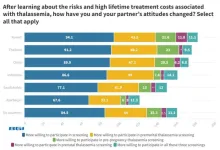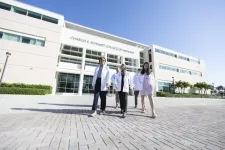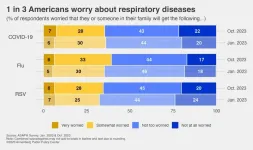(Press-News.org) Noise is an unseen pollutant with very real health impacts. Like many other forms of pollution, because of systemic injustice, it affects some people more than others. It also affects wildlife.
In a study published in Nature Ecology and Evolution, Colorado State University acoustic ecologists found that redlined, or marginalized, communities have more and louder urban noise, which has been linked to negative consequences for people and wildlife.
Ecological degradation exacerbates injustices against those living in formerly redlined areas, because people benefit from nature and wildlife, said Sara Bombaci, an author on the study and an assistant professor in CSU's Department of Fish, Wildlife and Conservation Biology. Now illegal, redlining was the discriminatory practice of denying loans or services to those living in non-white neighborhoods.
"We need to be thinking more about how these systemic injustices and problems are manifesting to shape ecology and evolution,” Bombaci said.
Bombaci and her research group examined urban noise distribution across historical racial divisions in 83 U.S. cities and evaluated hundreds of studies on the impacts of noise on wildlife. The team originally wanted to analyze ecological data on noise impacts to wildlife, instead of reviewing literature, but data in redlined communities are underrepresented, reflecting historical biases.
The study is the first to examine noise inequity in redlined communities. Results show that louder noise levels more commonly correspond with redlined urban areas and have detrimental effects on urban ecosystems proportional to their volume.
Redline noise
Starting in 1933, the Home Owners' Loan Corporation assigned grades to neighborhoods based on race and wealth. Grade A neighborhoods were wealthier and whiter, while red lines were drawn around grade D neighborhoods where people from various racial and ethnic backgrounds lived. Redlining was outlawed in 1968, but decades of divestment in these neighborhoods caused enduring disparities.
The study found that grade D neighborhoods experience 17% higher maximum noise levels than grade A neighborhoods, and grades C and D neighborhoods more frequently have maximum noise levels above the level known to cause hearing loss, physical pain and stress in humans.
"This is directly linked to structural racism,” Bombaci said. “There's a clear signal that ties directly to whether these communities were redlined.”
Some of the human health effects from noise pollution include hearing loss, stress, insomnia, hypertension and increased risk of heart disease and stroke. Persistent loud noise stresses wildlife too. It can alter animal behavior, including communication, community structure, distribution, fitness, foraging, mating, movement and reproduction. Noise can make some species more vulnerable to predators and cause wildlife to avoid certain areas.
Righting past wrongs
Many cities, like Denver, are working toward equitable planning to improve access to parks and green space in underserved communities. Bombaci said noise should be considered in those plans.
"If we're adding green space without mitigating impacts of noise, we might not be fully recognizing the benefits of these green spaces,” she said.
Wildlife might not bounce back in urban green space if noise pollution remains a problem, but planning and noise mitigation can help, Bombaci said, and conservation funding and urban planning can benefit both people and wildlife.
Additional authors of the study, “Inequalities in noise will affect urban wildlife,” are CSU students Jasmine Nelson-Olivieri, Tamara Layden, Edder Antunez, Monica Lasky, Steven Starr and Anahita Verahrami, as well as collaborators Ali Khalighifar (CSU), Theresa Laverty (New Mexico State University), Karina Sanchez (University of New Hampshire) and Graeme Shannon (Bangor University).
END
The sound of injustice: Inequitable urban noise impacts people, wildlife
2023-11-20
ELSE PRESS RELEASES FROM THIS DATE:
Grant backs research on teaching networks to make better decisions
2023-11-20
HOUSTON – (Nov. 20, 2023) – Picture a swarm of drones capturing photos and video as they survey an area: What would enable them to process the data collected in the most rapid and effective manner possible?
Rice University’s Santiago Segarra and Ashutosh Sabharwal have won a grant from the Army Research Office, a directorate of the U.S. Army Combat Capabilities Development Command Army Research Laboratory, to develop a machine learning framework that improves military communication networks’ decision-making processes. The research could also help inform applications such as self-driving vehicles ...
72% of Thai women persuade partners to seek genetic counseling if they are thalassemia carriers | BGI Insight
2023-11-20
According to Thailand's Ministry of Public Health, approximately 18-24 million or 30-40 percent of the Thai population carries the thalassemia gene, with moderately severe thalassemia patients requiring regular treatment, including blood transfusion and chelation therapy to remove excess iron from the blood.
To facilitate greater understanding of this hereditary hemoglobinopathy, BGI Genomics released its State of Thalassemia Awareness Report. This report assesses the level of knowledge and attitudes related to the associated ...
In many major crop regions, workers plant and harvest in spiraling heat and humidity
2023-11-20
A global study of major crops has found that farmworkers are being increasingly exposed to combinations of extreme heat and humidity during planting and harvest seasons that can make it hard for them to function. Such conditions have nearly doubled across the world since 1979, the authors report, a trend that could eventually hinder cultivation. The most affected crop is rice, the world’s number one staple, followed closely by maize. As temperatures rise, the trend has accelerated in recent years, with some regions seeing 15-day per-decade increases in extreme humid heat during ...
Understanding children’s views on the perfect school | Bentham Science
2023-11-20
Young Voices Unheard: Children’s Views from Scotland and Greece on Education is a new book published by Bentham Science that attempts to explore the question of how young children view the concepts of Children’s rights.
Giving children an opportunity to voice their ideas on their education is necessary, if we do not want to deprive children of their right to be consulted and their opinions to be listened to and be seriously considered when decisions are made affecting children’s lives (article 12 of the Convention).
The book attempts to give a voice to children aged 5 to ...
Bentham Science announces release of "Amazon Web Services: The Definitive Guide for Beginners and Advanced Users"
2023-11-20
In a world driven by digital transformation, Amazon Web Services (AWS) has emerged as a powerhouse, providing on-demand cloud computing platforms and APIs to individuals, companies, and governments. Bentham Science is delighted to unveil "Amazon Web Services: The Definitive Guide for Beginners and Advanced Users," a comprehensive text that simplifies the complexities of AWS, making it accessible to graduate students, professionals, and academic researchers in computer science, engineering, and information technology.
Key Features:
Hands-On Approach for Beginners: The book adopts a practical, hands-on approach, ensuring that beginners can dive into AWS ...
Redefining the quest for artificial intelligence: What should replace the Turing test?
2023-11-20
In a paper published Nov. 10 in Intelligent Computing, Philip Nicholas Johnson-Laird of Princeton University and Marco Ragni of Chemnitz University of Technology propose a novel alternative to the Turing test, a milestone test developed by computing pioneer Alan Turing. The paper suggests that it is time to shift the focus from whether a machine can mimic human responses to a more fundamental question: "Does a program reason in the way that humans reason?"
The Turing test, which has long been a cornerstone of AI evaluation, involves a human evaluator attempting to distinguish between human and machine ...
Suboptimal follow-up, prevention in geriatric fall-related head trauma
2023-11-20
Falls are the leading cause of both fatal and nonfatal injuries in the United States for adults ages 65 and older. With 1 in 4 older adults falling annually, 27,000 deaths, 8 million emergency department (ED) visits, and 800,000 hospitalizations have occurred.
Follow-up after an ED-related fall visit is essential to initiate preventive strategies in these patients who are at very high risk for recurrent falls. Currently, it is unclear how frequently follow up occurs and whether preventive strategies are implemented.
Researchers from Florida Atlantic University’s Schmidt College of Medicine and collaborators explored this issue by investigating ...
Over a third of Americans worry about getting the flu, RSV, or COVID-19
2023-11-20
PHILADELPHIA – Over a third of American adults are worried that they or someone in their family will get the seasonal flu, Covid-19, or RSV (respiratory syncytial virus) in the next three months, according to a new health survey from the Annenberg Public Policy Center (APPC) of the University of Pennsylvania.
Those three viral illnesses made up the “tripledemic” of respiratory illnesses that overwhelmed some health care facilities last winter. Although RSV typically peaks later in the year, this month hospitals in parts of Texas are already seeing emergency ...
State-of-the-art nanomaterial enabling ecofriendly removal of fine dust precursors
2023-11-20
Over the past decade, fine dust conditions in Korea have worsened, as perceived by the general public, with an increase in the number of days per year featuring high-concentration fine dust. Additionally, the previous maximum fine-dust concentration level has been surpassed. In response, the Korean government has expanded its financial investment in efforts aimed at addressing fine-dust issues.
Fine dust consists of particles that are too small to be seen with the naked eye. When these particles enter the human body through the skin and respiratory system, they can cause various diseases. According to a survey conducted by the Korea Environment Institute, three in ten people ...
AI-powered crab gender identification: revolutionizing fishery management and conservation
2023-11-20
When winter comes to Japan, fishermen in the northern regions set out to capture one of the most anticipated seasonal delicacies: the horsehair crab. Known locally as “kegani” and bearing the scientific name Erimacrus isenbeckii, this species of crustacean is highly sought after throughout the country. To protect the horsehair crab population from overfishing, the Japanese and prefectural governments have implemented various restrictions on their capture. For example, in Hokkaido, where kegani is abundant, capturing females for consumption is strictly prohibited.
To ...






